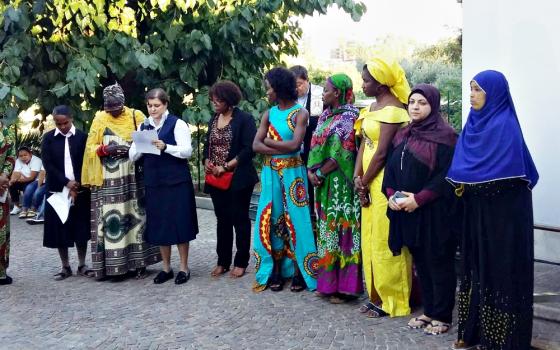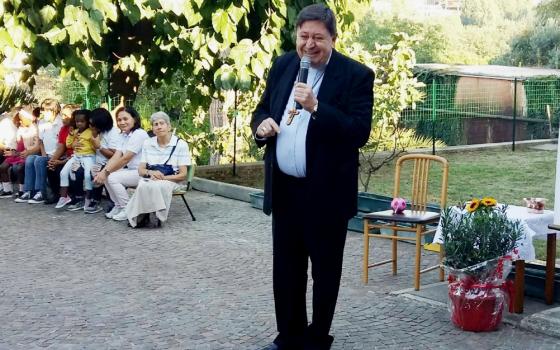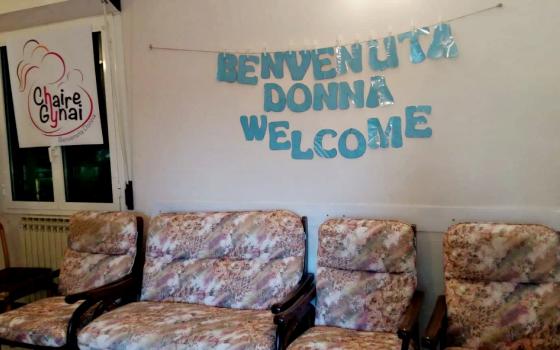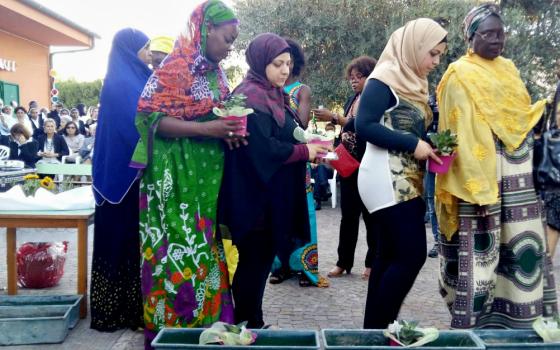"Welcome" was the word on everyone's lips during the recent inauguration of Chaire Gynai, a new project in Rome that provides support to migrant women in particularly vulnerable circumstances.
The initiative, which includes housing for refugee women and children, is the result of cooperation between the Missionary Sisters of the Sacred Heart of Jesus, the Missionary Sisters of St. Charles Borromeo, various Vatican offices, the International Union of Superiors General, and the Italian Catholic bishops' conference.
"Chaire Gynai" means "Welcome, Woman" in Greek. "Chaire" is the expression the Archangel Gabriel used to greet Mary as he announced to her the news of the Incarnation.
At present, 17 women and seven children live in the two houses, where they will receive professional and legal advice as well as language and skills training aimed at equipping them to become fully independent — working and living on their own in Rome — within a year.
Among this first group of beneficiaries are women from Nigeria, Syria, Uganda, Senegal, Congo, Cameroon, Ethiopia, India and Burundi. Several are former women religious who have decided to leave their congregations in India, Congo and Burundi but are unable or unwilling to return to their home countries. Some of the women already work in part-time jobs, and all of them are either registered as refugees or seeking to have their asylum status recognized. Catholic organizations, including Caritas, Sant'Egidio and the Jesuit Astalli Centre, referred the women to the sisters running the project.
At the inauguration of the largest house Sept. 30, Vatican officials, priests and religious, friends and families gathered to welcome the women, resplendent in their brightly colored dresses and headscarves. The red brick house, with its simple bedrooms, chapel, kitchen and communal spaces, is set back from a main road on the north side of the city, next to Rome's Gemelli Hospital. The land, which belongs to the Missionary Sisters of the Sacred Heart of Jesus (or Cabrini sisters, as they're more commonly called) includes a broad driveway flanked by grassy banks, tall trees and grapevines.
Last year, the Cabrini sisters met with Pope Francis and were struck by his appeal that religious congregations, as well as parishes and ordinary people, open the doors of their houses to families arriving in Italy after fleeing poverty and conflict across the Mediterranean Sea.
Sr. Barbara Staley, superior general of the Cabrini sisters, said the sisters had been living in the house on Via Pineta Sacchetti for 35 years but had no hesitation in deciding to move out for the Missionary Sisters of St. Charles Borromeo (known as the Scalabrini sisters), who were looking for a suitable place for their new center. She talked about the tragedy of migrants forced to seek safety in a place far from their families, their cultures and their native lands.
"Let us pray that in this house, there will be hope for these women," as well as a safe place for them to stay, she said.
At the opening, Brazilian Cardinal João Braz de Aviz, head of the Vatican's congregation for religious life, said the church is called to "sow seeds of hope" by welcoming refugee women and children. He said the pope is contributing financially to the costs of running the two houses and follows closely the progress of this and similar initiatives through regular briefings from the refugees and migrants section of the Dicastery for Promoting Integral Human Development.
The restoration of hope through the healing of trauma and suffering are two of the guiding principles of this new initiative, said Brazilian Sr. Eléia Scariot, a Scalabrini sister and director of the project.
The goal is to "support women in their path of integration and professional enhancement," while helping them contribute in a positive way to the development of society "here in the Roman territory where they are inserted," she said.
In Italy, the new populist coalition government appears set on enforcing anti-immigrant policies. For example, Italy's right-wing interior minister, Matteo Salvini, describes undocumented migrants as "a tide of delinquents" and touts the political slogan "Italians first."
On Oct. 2, days after the opening of Chaire Gynai, Mayor Domenico Lucano of Riace on the east coast of Calabria in Southern Italy was arrested and charged with aiding illegal migration. Lucano had opened Riace to the boatloads of migrants from Iraq, Afghanistan and Pakistan that began arriving on Calabrian shores in the early 2000s, revitalizing the town's population, which had dwindled to just a few hundred.
Lucano, whom Fortune magazine named one of the world's 50 greatest leaders in 2016, was also investigated for fraud and embezzlement, although these charges against him have been dropped. He remains under house arrest.
"Who knows what all the other do-gooders who want to fill Italy with immigrants will say now," Salvini wrote on Twitter.
Leaders of the Catholic Church, including Pope Francis, have responded to the rising xenophobia among Italian voters by saying such attitudes are in direct contradiction to Gospel values. In September, the pope encouraged participants at a conference jointly organized by the Vatican and the World Council of Churches to continue resisting attitudes of "suspicion, fear, contempt and even hatred" toward those of different ethnicities, nationalities or religions.
Politicians, he noted, succumb to the temptation of exploiting the fear of foreigners and using them for "shortsighted electoral interests."
"Claiming to protect Christian values or communities by shutting out those who seek safe refuge from violence and suffering is unacceptable, and undermines Christian witness in the world, and raises up national boundaries as idols," he said.
Brazilian Sr. Neusa de Fatima Mariano, superior general of the Scalabrinians, praised the cooperation between Vatican officials and the various religious congregations that have responded to the pope's call of prioritizing support for migrants and refugees.
She said the four words Francis uses when talking about the church's response — welcoming, protecting, promoting, integrating — "are the four verbs that guide our pastoral choices because no one should feel like a stranger. We are all sons and daughters of the same Father."
Several of the residents of the new center talked about their hopes and their gratitude for the sisters' support, particularly in providing a safe place for them and their children.
Rehemah Nakabiri, a 31-year-old from Kampala, Uganda, said she just wants to be able to provide for her daughter, a vivacious 5-year-old who danced and sang a welcome song at the start of the inauguration ceremony. Nakabiri has been in Rome for more than two years and does temporary work as a cleaner in the mornings, but said she hopes to find a more secure job and rent a place of her own. For the moment, though, she said she is happy to have made new friends at the center and to feel she can make a positive contribution to the community.
The inauguration marked a moment of celebration in the lives of these women, many of whom have escaped from hardship and violence in their home countries. At the end of the ceremony, as Braz de Aviz led prayers and a blessing of the house, the women symbolically took small flower pots from a table to plant in the garden. They represent the seeds of hope each one of them pledged to water and nurture in order to "grow and hand on" the gifts of welcome they have received.
While the women say they want to be "worthy of the gift" they have received, the sisters add that this work with migrants is "a grace that confirms us in our mission."
Mariano echoed the voice of many other sisters in thanking Francis for his appeal, "inviting us to respond to the issue he cares most about — the refugee women and their children."
[Philippa Hitchen has worked as a journalist at Vatican Radio for over 30 years.]




